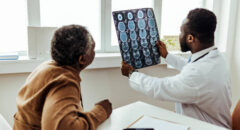 Did you know that a woman’s ability to absorb vitamin B12 slows down with age? In fact, 4 out of every 100 women ages 40 and older suffer from vitamin B12 deficiency, a condition in which the vitamin’s levels in the blood are too low.
Did you know that a woman’s ability to absorb vitamin B12 slows down with age? In fact, 4 out of every 100 women ages 40 and older suffer from vitamin B12 deficiency, a condition in which the vitamin’s levels in the blood are too low.
The significance? Vitamin B12 is a powerhouse that's essential for living. The nutrient holds a host of benefits including boosting mood, blood-cell formation, digestion, nervous system and brain function. Per the National Institutes of Health’s Office of Dietary Supplements, how much one needs will depend greatly on their age. However, in general, it’s recommended that both men and women over the age of 14 aim for 2.4 mcg of vitamin B12 each day. Pregnant women should ingest 2.6 mcg and women breastfeeding need 2.8 mcg daily.
Still, up to 15 percent of people don't get enough B12, and they're likely to be vegetarians, have celiac disease or other digestion problems, according to the Harvard Health Letter.
Here’s what happens when you don’t get enough:
- Foggy brain: Chronic forgetfulness may indicate a deeper medical issue.
- Weakness and increased fatigue: Researchers from the Academy of Nutrition and Dietetics claim that those who feel worn out and weary, even though they get plenty of rest may be experiencing low levels of B12.
- Constipation and diarrhea: Stomach troubles aren't always the result of something you ate. With a B12 deficiency, nausea, diarrhea and difficulty going number two is common.
- Anemia: Anemia happens when the body is unable to absorb the vitamin.
- Muscle weakness: No longer able to max out on the leg press? This may signal a lack of oxygenation of the organs – a responsibility of B12.
- Light-headedness and dizziness: You may feel wobbly if you get up too fast from a sitting position. Frequent bouts of vertigo are also common.
- Yellowing of the skin and eyes: Due to a lack of red blood cells, a B12 deficiency often results in a pale, yellowish complexion.
- Pain and weakness: Ever heard the term “pins and needles?” Well, that’s just what you’ll feel – tingling and numbness – throughout your body.
- Vision issues: In extreme cases, a deficiency can damage the optic nerve or plug up the blood vessels in the retina, in turn causing blurry vision, double vision, and sensitivity to light, even loss.
But it doesn’t stop there. If levels remain chronically low, vitamin B12 deficiency can lead to irreversible damage such as difficulty walking and dementia. Severe depression and psychosis may also occur.
Here’s how to combat low levels of B12:
- Eat a well-balanced diet: You can eat a ton of veggies and still not get enough vitamin B12. Try shellfish, fortified soy, red meat, low-fat dairy, cheese, and eggs.
- Recommendation from Harvard Health Letter: It's recommended that vegetarians and older people with atrophic gastritis take a multivitamin, eat fortified breakfast cereal, or both.
- If you’re experiencing symptoms or believe you're at-risk: Ask your doctor about getting a B12 blood test and a treatment plan if necessary.







